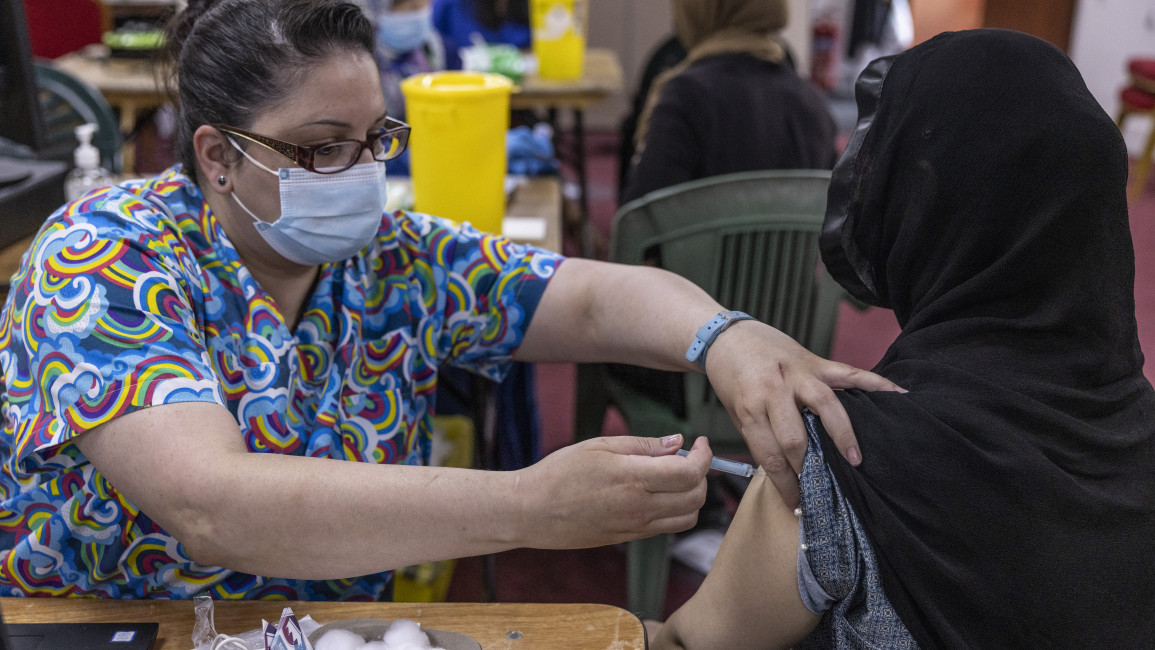London opens vaccine clinic for undocumented migrants after report exposes Covid-19 impact on refugees
A walk-in Covid-19 vaccine clinic for undocumented migrants opened in one of London's most deprived boroughs early on Saturday.
This comes days after a London University-backed institute published a report revealing the impact of vaccine nationalism on refugees and stateless communities across the world.
While a stateless person is often defined as someone who is not considered a national by any state under its law, statelessness can be the root cause of migration and forced displacement, as well as vice-versa.
Tower Hamlets GP Care Group, based in a borough with the highest rates of child poverty in the capital, tweeted an advert for its vaccination clinic for people without documents, temporary migrants, asylum seekers and homeless people.
The New Arab contacted the Tower Hamlets GP support group for comment but did not receive a response by the time of publication.
The British government issued a so-called vaccine amnesty for undocumented migrants, a community estimated to number as high as 1.3 million, in early February.
But hard-hit immigrant communities, who are known to have filled the frontline jobs most exposed to the virus and live in crowded, multigenerational housing, remain hesitant to ask for a vaccine, fearful of arrest or deportation.
Furthermore, right-wing exclusionary policies have created a climate of hostility and confusion, discouraging migrants from accessing medical care, according to some British doctors.
📣TODAY until 3.30pm we're holding a FIRST DOSES ONLY #CovidVaccine walk-in clinic at The Art Pavilion vaccination centre.
— Tower Hamlets GP Care Group (@THGPCareGroup) June 19, 2021
If you know an undocumented migrant, someone with insecure #immigration status, or someone who is #homeless, they can get their 1st #COVIDVaccination! pic.twitter.com/Yibck2r7pb
Statelessness and vaccine nationalism
A report published on Wednesday by the Global Covid-19 Consortium, set up by the Middlesex University-backed Institute on Statelessness and Inclusion (IS), details how refugees and stateless people have been excluded from national vaccination drives.
It brings together the experience and expertise of stateless activists, grassroots groups and NGO workers in 13 countries.
Entitled ''Together We Can: The Covid-19 Impact on Stateless People & A Roadmap for Change'', it documents the impact of the pandemic on 15 million stateless people and 10 million at risk of losing their nationality.
Five million Palestinians in the West Bank and Gaza were excluded from Israel’s vaccination drive. International law stipulates that Israel is obliged as an occupying power to provide jabs to those living under occupation.
As of May 5, only 3.6% of Palestinians had received one dose of the vaccine, with 1 percent fully vaccinated.
Impoverished Rohingya communities in India, Bangladesh and Malaysia still have not been allocated vaccines. A leading Rohingya activist cited in the report feared complete exclusion from the vaccination processes.
In Lebanon, Syrian and other refugees face barriers to registering on the country’s vaccine portal because of the need to input nationality information.
The research highlights how vaccine nationalism intersects with socio-economic deprivation.
"Internationally, 85% of the world’s vaccinations have been delivered in high and upper-middle income countries, with only 0.3% being delivered in low income countries, where many stateless people live", said Amal De Chickera, the report's co-author and visiting lecturer at Middlesex University
"At national levels, the citizens first approach taken by most states, completely excludes the stateless or pushes them to the back of vaccination queues. Such vaccine inequity is the latest example of how stateless people endure the combined impact of global and local inequalities."



